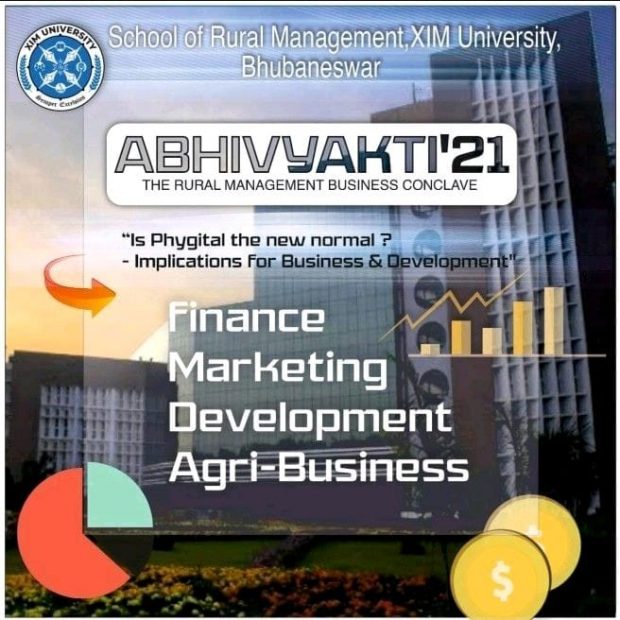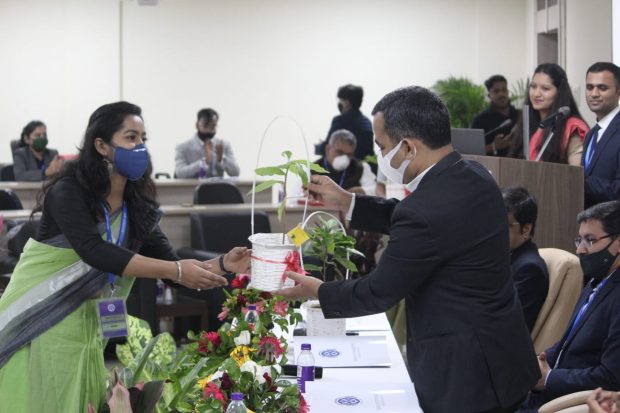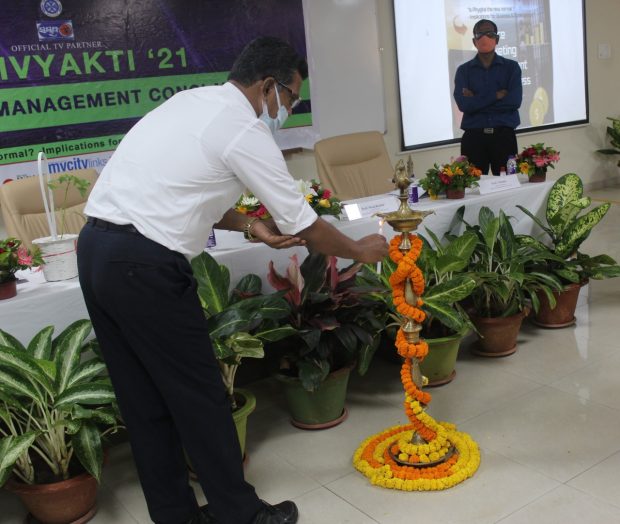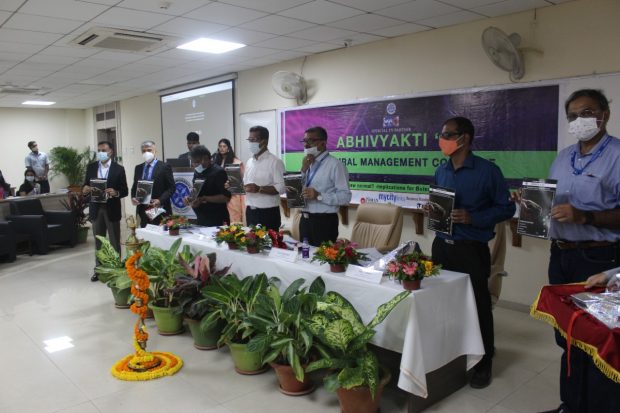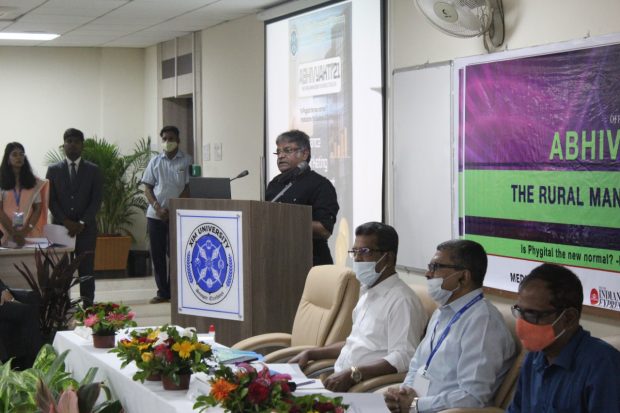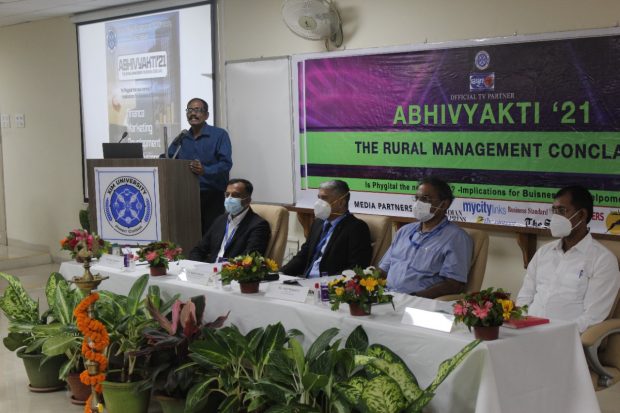School of Rural Management, XIM University (NewCampus), Odisha, and RMAX, Rural Managers’ Association of XIM University along with RM Career Advisory Services, hosted its annual flagship event, Abhivyakti 21, with stellar success on 30th-31st October 2021.
The theme for Abhivyakti’21 was “Is Phygital the new normal? Implications for Business and Development”. The event started with the lighting of the lamp, followed by a welcome note by Dr. Niraj Kumar, Dean, School of Rural Management, XIM University (New Campus), Odisha. He applauded the efforts of the staff and the students to carry out the first offline conclave in over an year, and explained how all protocols are being followed while still pursuing excellence through such enriching discussions.
Prof. Fr. S. Antony Raj, S.J, Registrar, XIM University, Odisha, gave the inaugural address. Amongst many invigorating ideas, Prof. Fr. Tony talked about the seamless connection between our lives, entertainment and work. He talks about taking a holistic approach of considering phygital as the new normal, which will have implications on the various aspects of business and help people’s development.
Fr. Antony R. Uvari, S.J, Vice-Chancellor, XIM University, Odisha, addressed the gathering. He discussed the importance of striking a balance between rural and urban India and the responsibilities of a rural manager to do so. He stressed the importance of bridging the gap between Indian Ink and Mera Bharat. This was followed by the panel discussions. Abhivyakti’21 was divided into four topics, and the event saw distinguished leaders discussing ideas and practices on the same.
The topic for the first panel was “Agriculture digitalization: future roadmap to instant solution for farmers.” The eminent speakers of the first panel were –
- Mr. Madhab Adhikari, Sr AVP & Business Head, Specialty Nutrients & organic fertilizers, Coromandel International Limited. He shared his thoughts on the importance of digitalization in agriculture and its implications for a sustainable future. He discussed the agricultural and value-creation opportunities that exist in the market. He talked about how the urban population is displacing the rural population and its impact on Indian agriculture. He concluded by outlining how the Essential Commodity Act is transforming the way commodities are sold and encouraging farmers to contribute more.
- Mr. Shanoj Chandroth, VP & Head of Digital Operations, Olam International, presented a thorough overview of himself and his organization. He spoke about global space and the agri solutions that his organization provides. He shared his insights on how increased urbanization is creating opportunities for farmers due to technological advancements. He shared the statistics of his organization’s growth and how it is helping farmers across the country.
- Lt. Col. Ashit Mahapatra (Retd.), MD & CEO, Agri Link Food Processing Private Limited, shared his experience from the three domains: Rural Finance, Dairy sector, and Agri-food processing sector. He also touched upon the importance of digitalization and how it reaps better results. Furthermore, the examples cited by Mr. Mahapatra were very insightful from the three domains, gave broad prospects about how the factors hold prime importance in rural households.
Prof. Balram Bhushan, Assistant Professor, School of Rural Management, XIM University, moderated panel one discussion. Post the panel discussion, the moderator opened the platform for a Q&A session.
Followed by the first session, The topic for discussion in panel two was “Reinventing offline marketing: Blueprint Sketch for New Normal”. The panel comprised of-
- . Arbind Sahoo, Director, Ruchi Foodline, enlightened the students by elaborating how the world is proceeding towards a complete digital era. He further talked about how Ruchi Foodline has entirely digitized the sales department because the customer will be more inclined towards a product when it is easy to use. Additionally, he emphasized the importance of the human element in the business world and how it cannot be eliminated.
- Ms. Pragya Agrawal, Regional HR Head (Mumbai) Landmark Group, commenced her talk by giving an overview of the current situation of the retail industry and how COVID-19 has affected it. She also emphasizes how Landmark Group is reinventing traditional marketing methods, followed by a few insights. She concluded her talk by stating the importance of brick and mortar in the retail industry and said that reinvented traditional marketing is a key driving factor.
The panel two discussion was moderated by Dr. Niraj Kumar, Dean, School of Rural Management, XIM University. After the panel discussion, students of the SRM batch engaged in an insightful interaction with speakers through the Q&A session.
The third-panel discussion took place the next day. The topic was “Scope of technology in Rural Development.” The speakers of the third panel-
- Mr. W G Prasanna Kumar, Chairman, MGNCRE, started his talk by sharing his views on the National Education Policy 2020 and how its implementation provides the students new opportunities and flexibilities. The speaker then talked about the marketing methods people use in rural areas that are not generating the expected results and a need for skill development. He also elaborated on the economies of scale that takes place while selling products in rural areas.
- Mr. Ambika Prasad Nanda, Head CSR Odisha, Tata Steel, addressed the effects of natural disasters on people living in rural India. Further, he discussed how technology has helped in reducing the casualty rate. He highlighted the importance of capacity building programmes of communities and state institutions. Towards the end, he encouraged the students to get involved in live projects to expand their knowledge spectrum.
- Mr. Sanjit Kumar Behera, Director, Practical Action Foundation, primarily focused on the evolution of technology in rural India with the help of a few examples. Further, he gave a detailed description of the technology used in the UNDP Project of Western Odisha. He also emphasised how technology in rural areas has improved but there is still scope for further advancements.
- Mr. Sachin Sachdeva, Director India, Paul Hamlyn Foundation, enlightened the students by discussing technology’s constructive and destructive aspects. He shared his views that technology should be looked at as something that can positively change people’s lives. He concluded that technology based on human elements is crucial and highlights the importance of physical interaction over the coming years.
The panel three discussion was moderated by Dr. T. Kumar, Associate Professor, School of Rural Management, XIM University. After the panel discussion, the moderator opened the platform for the Q & A Session.
The theme for the discussion for panel 4 was “Post Covid: Transition and Innovative Banking Business.” The eminent speakers of the panel were-
- Mr. Saurav Mukherjee, CEO, COO, Senior Vice President, Samunnati Financial Intermediation and Services Private Limited. He discussed the necessity of finance in the rural sector, emphasizing on understanding the customer’s needs. This entails establishing trust with farmers and, eventually, establishing input units for them to conduct cashless transactions. He also discussed how his company has partnered with rural logistics, in which corporations such as Amazon provides fertilizers and pesticides, and farmers pay through paycard. He ended by stating that farmers should be given comprehensive financial help.
- Mr. Bharath Sondur, Chief Business Officer, Suryoday Small Finance Bank Limited. He emphasised the need to view problems as positive opportunities to be seized. He expressed concern about the obstacles caused by the pandemic, such as the economic downturn, but reaffirmed his belief in how we, as a nation, have dealt with it. He shared real-life examples of how he remained positive in the face of adversity. He concluded by encouraging people to think and be positive in all situations.
- Mr. Ashwani Kumar, MD & CEO, Utkarsh Corelnvest Limited. He discussed the most critical aspects of the Microfinance industry. He described the licencing of non-banking financial businesses (NBFCs) and microfinance institutions (MFIs) as it eliminates the need for the customer to go to two different entities for their financial services. He also analysed the use of mobile phones in rural areas and how COVID-19 has aided in the advancement of technology. He stated that while we have entered the digital era, the physical market will continue to exist. Some situations can only be dealt with by physical support.
The panel four discussion was moderated by Mr. Pradeep Kumar Mishra, Associate Professor, School of Rural Management, XIM University. Post the panel discussion, students of the SRM batch interacted with speakers through the Q&A session.
The discussion ended with a vote of thanks by Varsha Priyadarshini, Coordinator, RMAX, School of Rural Management, XIM University, where she extended her gratitude to the dean, registrar, speakers, moderator, faculty members, and everyone who contributed to its smooth functioning and flawless execution.

